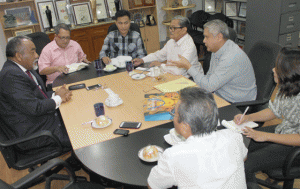MANILA seems to have found a major ally in India in its territorial dispute with China in the West Philippine Sea (South China Sea).
In a roundtable interview with editors and staff of The Manila Times on Tuesday, Indian Ambassador to the Philippines Shri Lalduhthlana Ralte said New Delhi, like the Philippines, believes that the only viable and effective way to resolve the dispute is by subjecting the issue to international arbitration.
South Asia’s use of international tribunals to settle maritime disputes, according to him, should be emulated in resolving the South China Sea dispute.
“Our view with that such kind of disputes [is that], the claimant countries should observe international law and norms that disputes are to be settled peacefully. We should allow ourselves to be subjected to international law,” Ralte said.
In July 2014, the Permanent Court of Arbitration ruled on the Bay of Bengal dispute between India and Bangladesh.
The tribunal, based in The Hague, awarded 19,467 square kilometers of a total disputed area of 25,602 km to Bangladesh.
India accepted the tribunal’s judgment and hailed the court for bringing to closure its long-standing dispute with Bangladesh.
In 2011, the two counties also peacefully resolved their land border dispute
“I think that’s diplomacy all about. Even if we are [the] stronger country, politically or economically, we should abide by internationally accepted principles,” Ralte said.
India is one of Asean’s dialogue partners, alongside Australia, China, Japan, New Zealand, Russia, South Korea and the United States.
Asean, which stands for Association of Southeast Asian Nations, groups the Philippines Brunei Darussalam, Cambodia, Indonesia, Laos, Malaysia, Myanmar, Singapore, Thailand and Vietnam.
The Philippines, Brunei Darussalam, Malaysia and Vietnam, along with non-members China and Taiwan, have conflicting claims to parts or all of the South China Sea.
Tensions rose in recent years as China was seen to have become more aggressive in enforcing its claims.
The Philippines and Vietnam took the territorial dispute to the United Nations for arbitration, which China vehemently opposes, insisting that the conflict should be settled bilaterally.


